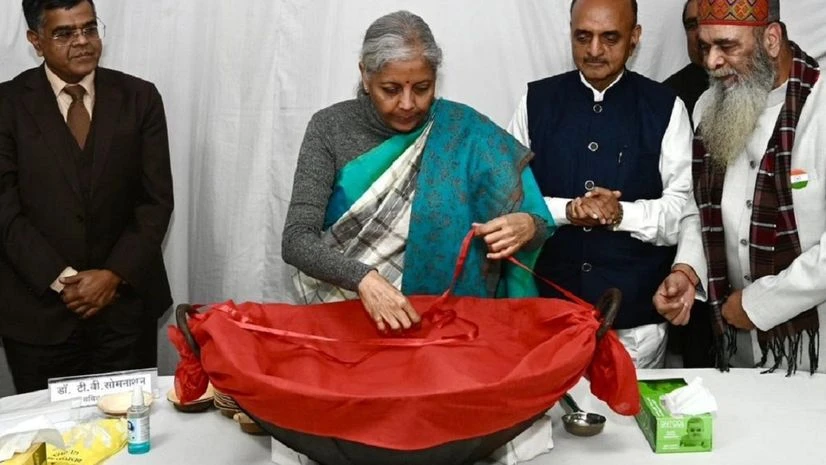Finance Minister Nirmala Sitharaman on Wednesday participated in a traditional 'halwa' ceremony, marking the final stage for preparation of the Interim Budget 2024 to be unveiled on February 1 in the Lok Sabha.
The ceremony is an annual ritual in which the traditional dessert 'halwa' is prepared and served to officials and staff members of the finance ministry who are involved in the preparation of the Budget.
It is organised every year in the basement of North Block, which houses the ministry in the national capital and is attended by the finance minister and other high-ranking officials.
A customary Halwa ceremony is performed every year before the 'lock-in' process of Budget preparation begins, an official statement said.
As part of the ceremony, the finance minister also took a round of the Budget Press and reviewed the preparations besides extending her best wishes to the officials concerned. Like the previous three full Union Budgets, Interim Union Budget 2024 will also be delivered in paperless form, it said, adding that the Interim Union Budget 2024 is to be presented on February 1, 2024.
All the Union Budget documents, including the Annual Financial Statement (commonly known as Budget), Demand for Grants (DG), Finance Bill etc. as prescribed by the Constitution, will be available on the "Union Budget Mobile App" for hassle-free access to Budget documents by Members of Parliament and the general public, the finance ministry said in a statement.
The app is bilingual (English & Hindi) and will be available on both Android and iOS platforms. It can also be downloaded from the Union Budget Web Portal www.indiabudget.gov.in, it said. The Budget documents will be available on the app after the finance minister completes the Budget speech in Parliament on February 1, 2024, it added.
More From This Section
Besides Sitharaman, Minister of State for Finance Bhagwat K Karad and other senior officials, including Finance Secretary T V Somanathan, Economic Affairs Secretary Ajay Seth, DIPAM Secretary Tuhin Kanta Pandey, Financial Services Secretary Vivek Joshi and Revenue Secretary Sanjay Malhotra, were present at the ceremony.
Chief Economic Advisor Anantha V Nageswaran, Central Board for Direct Taxes (CBDT) Chairman Nitin Gupta, Central Board for Indirect Taxes and Customs (CBIC) Chairman Sanjay Kumar Agarwal, Additional Secretary (Budget) Ashish Vachhani and other officers and finance ministry staff, involved in the Budget preparation and compilation process, were also present on the occasion.
Halwa ceremony:
It is a kind of a 'send-off' for finance ministry officials and staff involved with the preparation of the Union government's annual financial statement. They enter what is called a 'lock-in' period, during which they stay in the basement of North Block, cut off from the world outside with a view to maintaining the secrecy around the final budget document. They will emerge only after the finance minister completes her Budget speech in the Lok Sabha on February 1. It is considered a gesture of appreciation for those who have worked on the Budget. The basement of North Block houses a printing press that was traditionally used to print budget documents for 40 years from 1980 to 2020. Thereafter, the budget went digital with bare minimum documents printed and the bulk distribution happening via mobile app or on the website. Going digital also meant that the lock-in period has gotten shorter to just five days from the previous one which lasted up to two weeks.
Printing Press:
All Budget-related documents are printed at North Block itself using a dedicated government press. Earlier, the documents were printed at Rashtrapati Bhavan, but this was shifted to a press on Minto Road in the national capital in 1950 after documents were leaked, and in 1980 to North Block. The printing of several hundred copies of the voluminous budget documents was such an elaborate exercise that printing staff had to be quarantined inside the printing press in the basement of North Block for up to two weeks.
Tradition:
While the Narendra Modi government has done away with several traditional aspects of the Budget since coming to power in 2014, such as merging the Rail Budget with the main Budget, bringing forward the date of presentation to February 1 instead of the last date of that month, and moving to a digital format -- the 'halwa' ceremony as a tradition has survived. Since coming to power, the Modi-led government has curtailed the printing of Budget copies, initially culling copies distributed to journalists and outside analysts and then reducing those provided to MPs citing the outbreak of the pandemic. Last year, the outbreak of the highly infectious Omicron variant brought more curbs.

)
